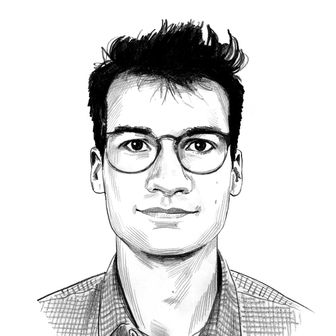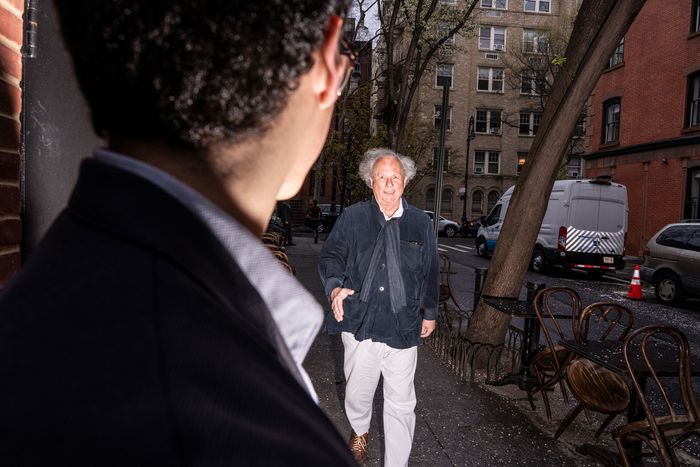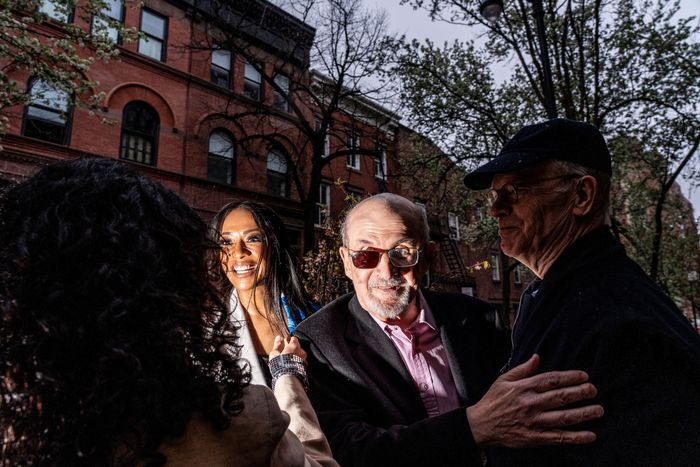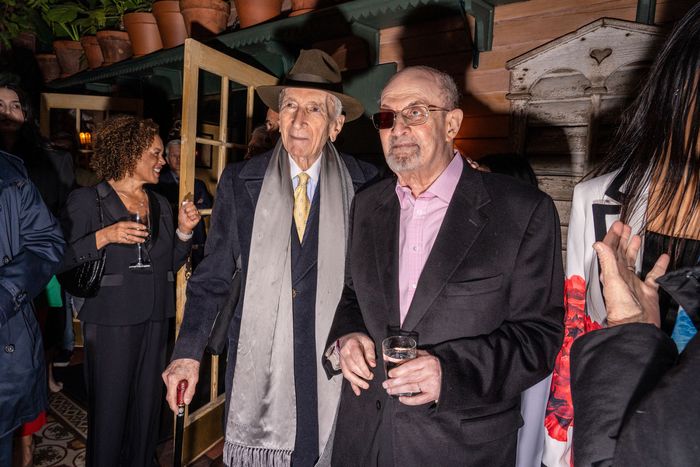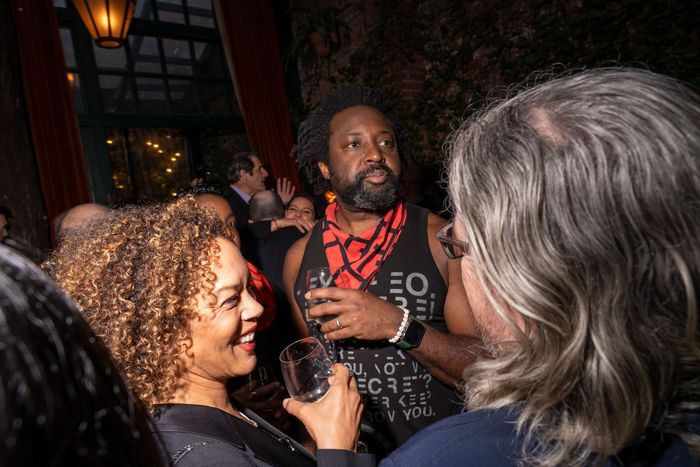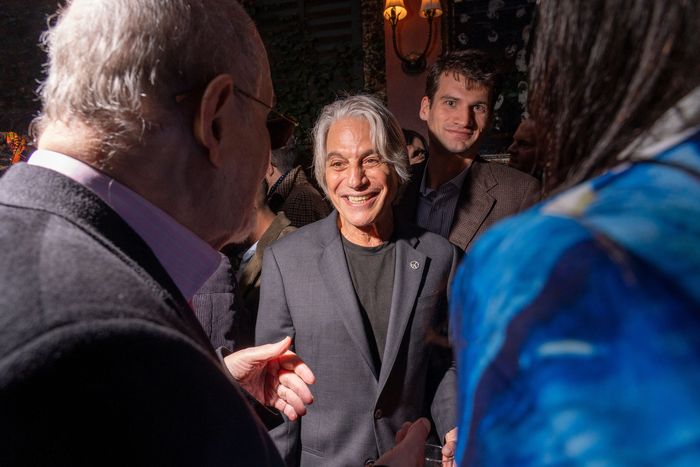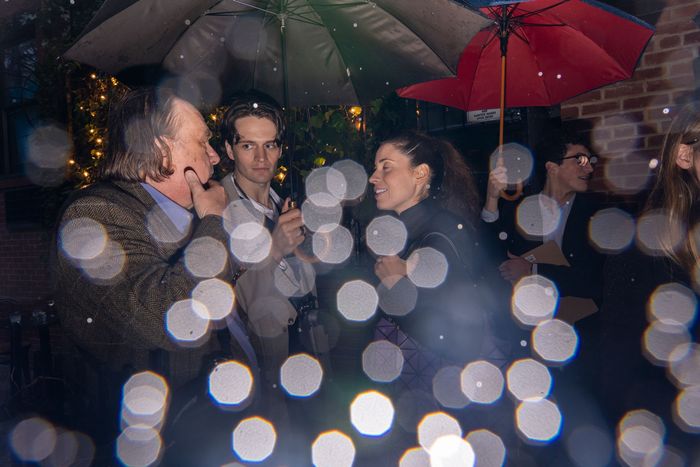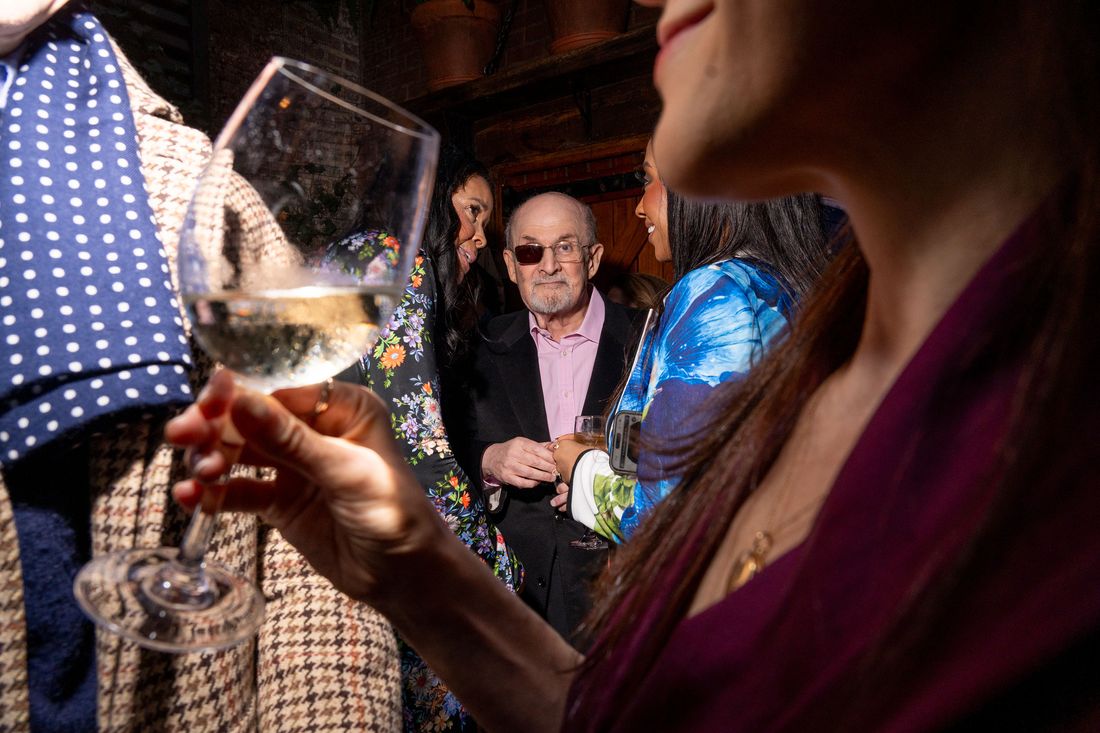
This article was featured in One Great Story, New York’s reading recommendation newsletter. Sign up here to get it nightly.
A few minutes before Salman Rushdie’s book party begins, his longtime literary agent, Andrew Wylie, is sitting at a table outside the Waverly Inn with a Hoyo de Monterrey Cuban cigar between his teeth. He’s holding what might be the event’s only physical copy of Rushdie’s new work, Knife: Meditations After an Attempted Murder. Wylie starts to hand it over, then pulls it back. I can’t read it yet, and neither can anyone else. “60 Minutes won’t let it out,” Wylie says, explaining that there’s an embargo until Rushdie’s interview with Anderson Cooper airs in a few nights.
The book cover’s design bears a Lucio Fontana–inspired gash, where the I in “KNIFE” should be. “There was a slightly longer title, like Knife in the Eye, or something,” Wylie says. “I suggested it should be Knife.” He looks up. “Jonathan!” he bellows. It’s Jonathan Becker, the storied Vanity Fair photographer.
Becker, who also has a cigar, nods toward the restaurant. “You think it’s safe in there?” he asks. “I think I’ll stand out here.”
How do you appropriately celebrate a memoir about being stabbed almost to death? For one, says the host of Thursday night’s party, Air Mail’s Graydon Carter, you hire security. “I think anytime anybody with political views goes onstage, they think about what happened to him,” Carter says. Two summers ago, during an appearance at the Chautauqua Institution, Rushdie suffered a near-fatal attack that blinded him in one eye and left him hospitalized for six weeks. The stabbing came more than three decades after Iran’s Ayatollah Khomeini, objecting to Rushdie’s depiction of the Prophet Muhammad in The Satanic Verses, called for his assassination.
“Salman led a pretty full life after being the subject of a fatwa,” Carter notes — but since the Chautauqua attack, he’s hardly been so exposed in public. Tonight, at his restaurant in the West Village, Carter has enlisted a team of plainclothes guards from the boutique firm that handled his old Vanity Fair Oscars parties.
The party takes place in the little glassed-in atrium at the back of Waverly. It’s difficult to move without elbowing someone’s drink. Rushdie, 76, is in the center of the throng, wearing what has become his post-attack trademark: a pair of rectangular-frame glasses with the right lens blacked out. He gamely receives supplicants and well-wishers but looks physically diminished and stays mostly hemmed in by a protective bubble formed by his fifth wife, the poet Rachel Eliza Griffiths; the journalist Bill Buford; and a handful of novelists, among them Marlon James and Gary Shteyngart.
The room is too cramped for Laurie Anderson, who leaves almost immediately, and for Gay Talese, who ducks into the main dining room to eat. Vanity Fair characters from the ancien régime — James Wolcott, William D. Cohan, Lili Anolik — orbit, while young Air Mailers take pictures and hold clipboards.
Tony Danza is standing alone by a wall. Does he know Rushdie? “No,” Danza says. “I thought, This is a man I’d like to meet.” CNN’s Kaitlan Collins appears in a cerulean dress. “I’m grateful he’s alive, and I’m a huge fan,” she offers.
Danza nods vigorously. “How about surviving what he went through?” he says. “And by the way, I’m Italian. You know, Italians, we have a fatwa. It’s called a hit. You know what I mean? We know what that is.” Collins disappears, and Danza decides to approach Rushdie. “I’m going to make a move,” he says, barreling through. “If you’re COVID-scared, you gotta be nuts here.”
I attempt my own approach, using Danza as a shield, only to be intercepted by a Random House publicist. Rushdie, he says, will not be taking questions. Later, after the aide is gone, I introduce myself. “I am not here to be interviewed,” Rushdie says. I ask how his recovery is going. “You’re starting to interview me,” he says. One of the world’s most famous exponents of free expression, muted at last.
Rushdie doesn’t address the crowd; no books are sold. Over in the dining room, Talese is drinking a Narragansett and eating chicken potpie. “This is the first time I’ve been at a book party without a book,” he says. “Yeah, this is not a book party. But he’s here. You wonder why he’s here. Why is he here? He’s taking chances. A lunatic in New York could shoot him anywhere. I mean, look at him right now. The guy refuses, whether you like it or not, to hide. Right? This fucking party tonight personifies his recklessness, his beautiful recklessness.”
There is consensus on this matter among Rushdie’s friends. Marlon James compares Rushdie’s attacker, a 26-year-old New Jerseyan who said he never read The Satanic Verses, to Dylann Roof, the Charleston mass shooter. “Ultimately, he’s no different. He’s a homegrown deluded terrorist with a sense of his own grandeur and has nothing to do with Islam,” James says. “I’m not sure what we should take from it. Be careful in the world? But then, if we end up being afraid in the world, then he won.” (A trial, originally set for January, was delayed because of Rushdie’s memoir.)
The actor Rupert Friend, who’s known Rushdie a decade and played Stalin’s memorably drunk son in The Death of Stalin, says, “Looking at this room, I don’t think there’s anyone in New York who doesn’t know him. It took this horror, but true to form, Salman takes that and turns it into some form of art and celebration.”
The last time Carter and Air Mail threw a book party at the Waverly it was for Sloane Crosley’s Grief Is for People, a memoir about the death of her best friend. Crosley is here tonight too. “What’s funny is that that party was ever so slightly darker,” she says. “Because my friend died by suicide and Salman lived.”
I ask Gary Shteyngart if it is okay that everybody seems to be having such a good time. “Yeah! Because Salman is having a good time,” he says. “He is so resilient. He loves going out. If that happened to me? I’m the opposite of stiff upper lip. I’m quivering bottom lip.”
The question of should Salman be partying has dogged the author for decades. Around the turn of the millennium, after a decade of hiding in London, he left his third wife for Padma Lakshmi, moved to the U.S., shed his life of seclusion, and became a fixture on the nightlife circuit. “He went through a big exercise in effort to get back into the public world to socialize,” Wylie says. “He’s gregarious. It’s his nature. He went to parties and shit like that. It was all a matter of breaking out of the sort of security bubble that had been placed around him.”
Rushdie caught flak for it. “People used to give him a hard time for going out at night in the early aughts,” Crosley says. “And I’m like — let him go to Bungalow 8, he had a fatwa!”
That backlash dovetailed with the erosion of Rushdie’s critical reputation. In 2012, he wrote a name-dropping third-person memoir called Joseph Anton — he took his pseudonym after Joseph Conrad and Anton Chekhov — full of passages about weekends in the Hamptons and prizes he won or didn’t win. “He would eat at Balthazar, Da Silvano, and Nobu,” Rushdie wrote about himself. “He would go to movie screenings and book launches and be seen enjoying himself at late-night hot spots such as Moomba, at which Padma was well known. He would inevitably be jeered at in some quarters for turning into some sort of party monster, but it was the only way he could think of to demonstrate to people that they didn’t have to be afraid.”
Zoë Heller, in a New York Review of Books pan, wrote that Rushdie “would have us understand that his copious accounts of nightclubbing with celebrities are the record of a doughty man’s will to survive, of his commitment to a moral duty.”
The decade went on; the reviews got worse. In 2019, Parul Sehgal wrote that his magical-realist style had grown “wobbly, bloated, and mannered. He is a writer in free fall.” On Twitter, Rushdie compared her to Iago. In 2021, an essay collection of glorified (and sometimes literal) commencement speeches was massacred by critics left, right, and center. The Times’ Dwight Garner summed up Rushdie’s status: “Too old to seize a moment, too active to be rediscovered, he’s been subject over the past two decades to some of the unkindest reviews ever delivered to a talent of his magnitude.” (“That’s transitory,” Wylie says, “I mean, you know the history of significant writers who have been disparaged and ignored. Borges was ignored. Nabokov, ignored. Calvino was ignored.”)
But after the attack, the literary community rallied around Rushdie. In a glowing Atlantic review of his 2023 novel, Victory City, Judith Shulevitz recast his propensity for shtick as a “commedia dell’arte drawing on his personal suffering” and an argument for “noisy, messy democracy” over “humorless and hierarchical” fundamentalism. When the fatwa was issued, Rushdie wryly told the New Yorker last year, he benefited from a “sympathy wave”; when he was stabbed, sales of The Satanic Verses surged again. “Now that I’ve almost died, everybody loves me,” he said. “That was my mistake, back then. Not only did I live but I tried to live well. Bad mistake. Get 15 stab wounds, much better.”
Initially, Rushdie said he didn’t want to write about the attack, fearing readers found his life more interesting than his books. He is arguably the world’s last celebrity novelist, and he is aware it’s thanks to the fatwa. “Martin Amis said that when the fatwa came down, ‘Salman vanished into the front page,’” Wylie says. “You know, he doesn’t want to be on the front page. He wants to be a writer.”
Perhaps wisely, with the sympathy wave still rolling, Rushdie has decided to be both. “It did nothing, it didn’t move any agenda, it did not spread fear into him,” Shteyngart says, of the attempted murder. “Hopefully it’ll produce a good book.”


